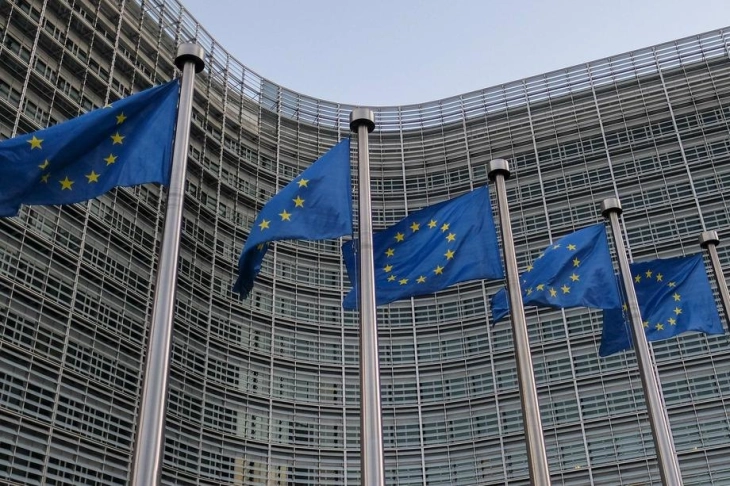EU ministers approve €1.4bn Ukraine military aid using Russia assets
- EU foreign ministers approved €1.4 billion ($1.5 billion) in military aid for Ukraine, with the package to be financed for the first time by proceeds from frozen Russian Central Bank assets, diplomats told dpa on Monday.
- Post By Angel Dimoski
- 18:54, 24 June, 2024

Luxembourg, 24 June 2024 (dpa/MIA) - EU foreign ministers approved €1.4 billion ($1.5 billion) in military aid for Ukraine, with the package to be financed for the first time by proceeds from frozen Russian Central Bank assets, diplomats told dpa on Monday.
Top EU diplomat Josep Borrell said ahead of the ministers' meeting in Luxembourg that the funds needed to reach Ukraine quickly and "avoid any blockage."
The approval comes as a welcome boost for Kiev amid Hungary's ongoing opposition to other packages from an off-budget fund called the European Peace Facility (EPF) worth more than €6 billion.
Each EU member state has a veto on EPF payments and Hungary has been blocking some disbursements related to Ukraine for nearly a year. A €5-billion support fund is also blocked.
EU diplomats were not expecting a breakthrough on the EPF deadlock with Hungary. As a result, Ukraine military aid from the proceeds is a useful alternative means of support.
Careful legal footwork to enable aid
EU member states first gave their approval to use the proceeds to buy arms for Ukraine in May however it was unclear when the first payments would flow due to Hungary's veto.
A legal analysis noted that as Hungary abstained on the decision to use the frozen assets for Ukraine, and that the new aid is derived from the Russian Central Bank assets and not EU funds, Budapest's veto does not apply.
Borrell said on Monday the finances "cannot get stopped. It has to be used. We have a legal procedure in order to avoid any blockage."
Hungary opposes military aid for Ukraine fearing an escalation of the conflict with Russia and expresses doubts about Western support for Ukraine, preferring instead to call for a ceasefire.
However, Hungarian Prime Minister Viktor Orbán has previously linked decisions on aid for Ukraine to freeing up EU funds for Hungary that have been frozen due to concerns about the rule of law.
Military and financial aid for Ukraine
The military aid for Ukraine uses the interest and other profits from the assets, but not the underlying assets themselves, which will remain frozen.
A total of 90% of the money will fund military aid, while 10% will go directly to Ukraine as financial aid.
Under the agreement, Germany and the Czech Republic have been selected as the first to use the proceeds to provide Ukraine with air defence equipment and artillery shells, EU diplomats said.
Other EU member states may administer the proceeds in the future.
According to the European Commission, around €210 billion worth of Russian Central Bank assets are frozen in the EU.
The Brussels-based financial institution Euroclear, which holds the lion's share of the assets, recently announced that the assets had made around €4.4 billion in interest in 2023.
Russian LNG targeted in EU sanctions first
EU foreign ministers also adopted new punitive measures to crack down on sanctions evasion and stop Russia from obtaining Western technology for making weapons.
A further 69 individuals and 47 entities linked to the Russian invasion of Ukraine have been sanctioned with an asset freeze and a travel ban to the European Union.
The new salvo of sanctions target Russia's multi-billion dollar liquefied natural gas (LNG) sector for the first time.
These punitive measures ban ports such as Zeebrugge in Belgium from shipping Russian LNG to countries outside the EU after a nine-month transition period.
Also targeted is Russian President Vladimir Putin's so-called "shadow fleet" used to avoid sanctions including 27 specific vessels.
German opposition to the 14th sanctions package needed to be overcome, EU diplomats said, as Berlin was concerned the 14th sanctions package went too far, especially for subsidiaries.
EU diplomats said a compromise was reached, allowing measures halting exports to Russia - the so-called "No Russia" clause - to not apply to subsidiaries for the time being. The issue is to be revisited.
Ukrainian Foreign Minister Dmytro Kuleba briefed his EU counterparts on the war situation via video call.
Western Balkan foreign ministers were also invited to discuss foreign policy.
Photo: MIA Archive







